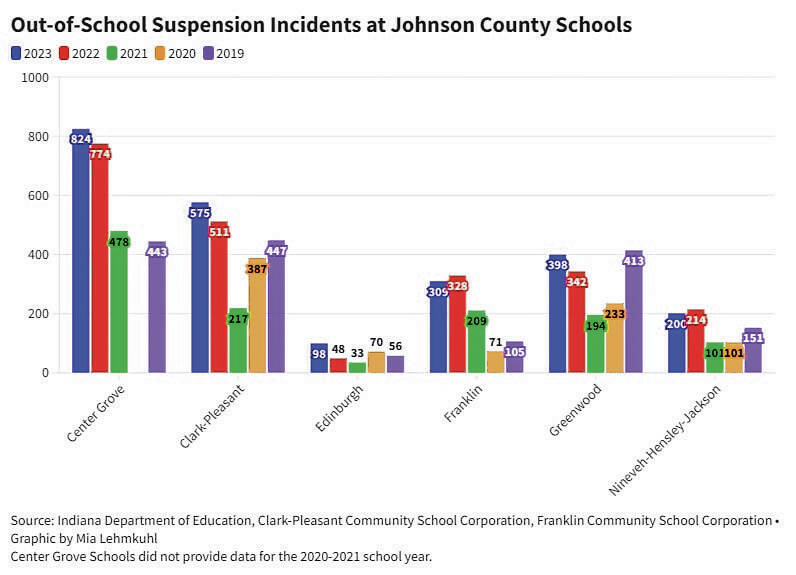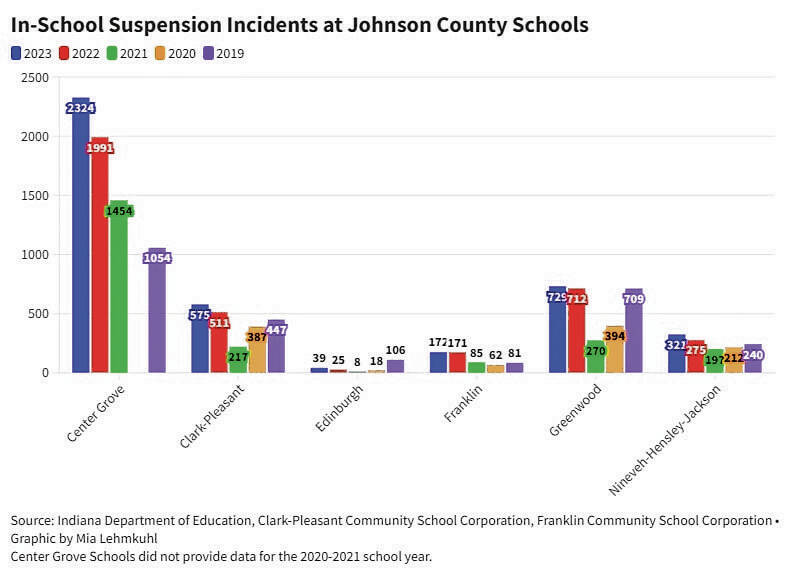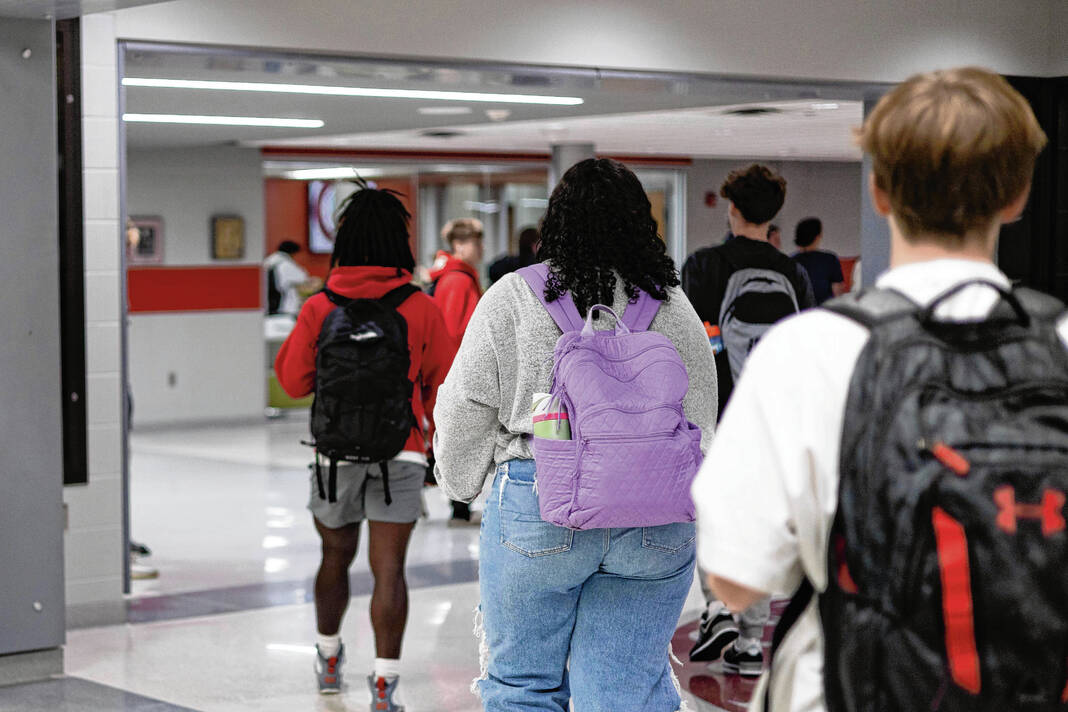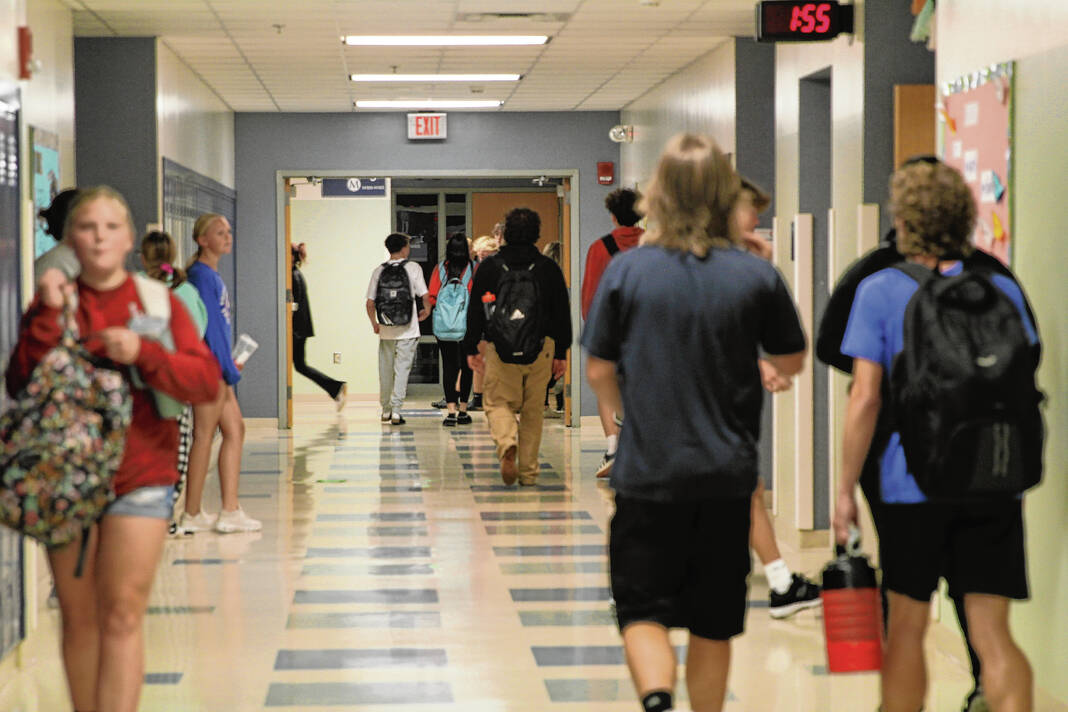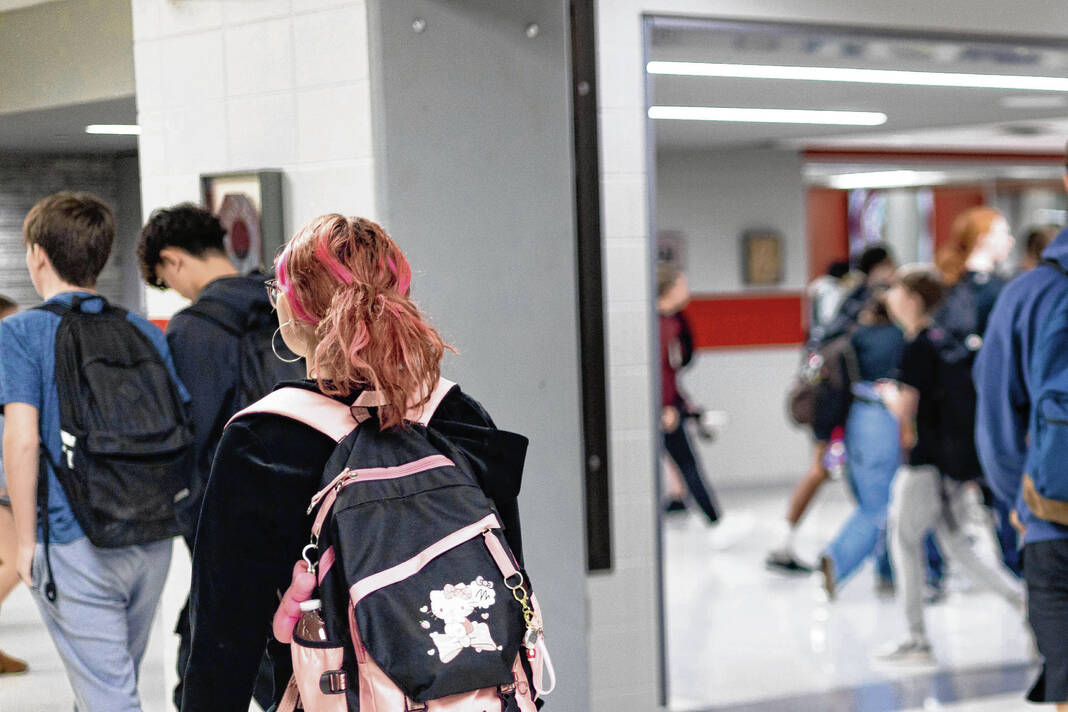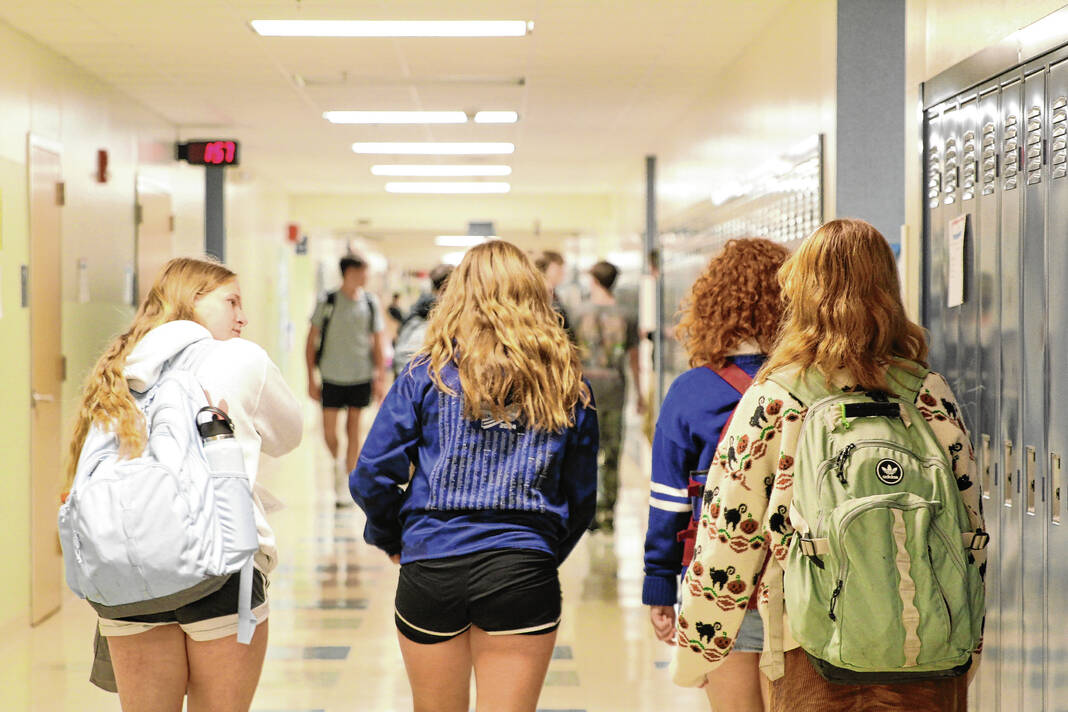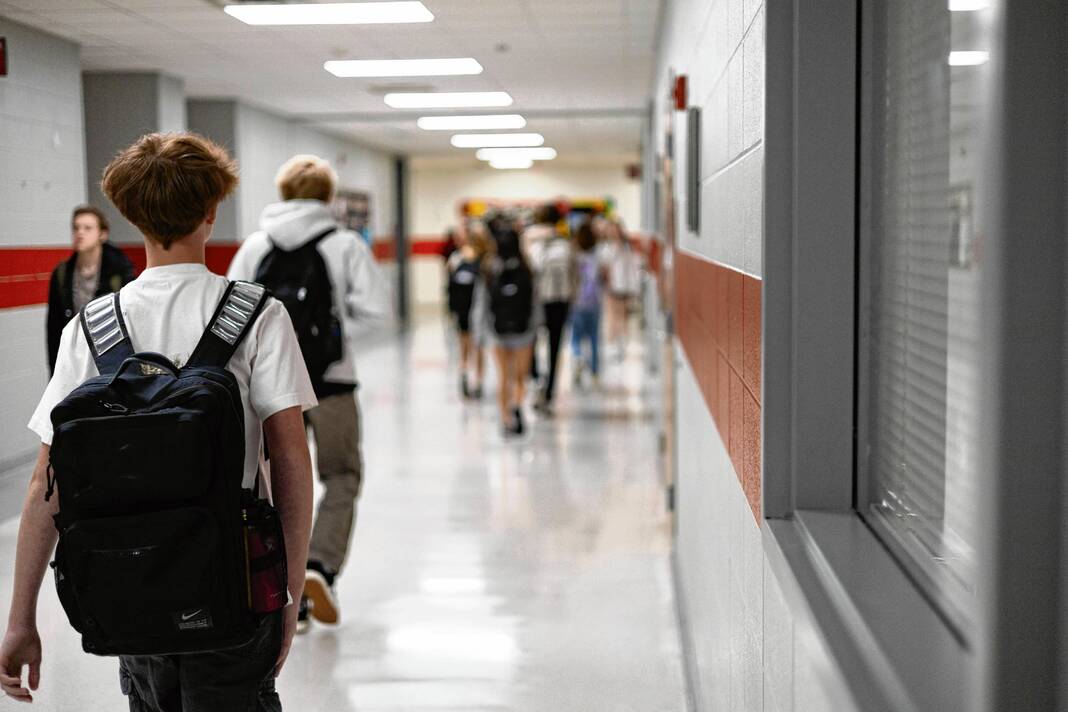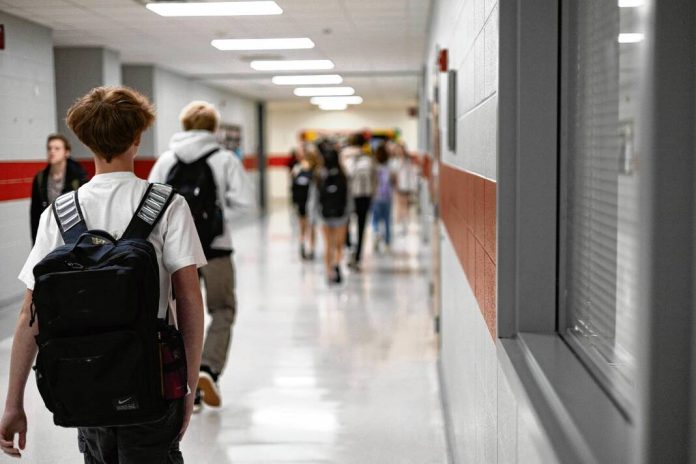
Students walk down the hallway at Center Grove High School. Students pictured do not necessarily have a disciplinary issue. Provided by Center Grove Schools
A rise in disciplinary issues is attracting the attention of Indiana legislators and school officials in Johnson County.
When comparing disciplinary incidents in the state using Indiana Department of Education data, incidents remained relatively stable from 2011 to 2019 across the state. During the COVID-19 pandemic, disciplinary issues dropped drastically as a result of fewer students being in the classroom.
However, since students returned to schools in person and pandemic restrictions were lifted, incidents across the state have spiked since 2021.
Due to this rise, part of the Indiana General Assembly’s summer study committees were assigned to investigate the problem. State Rep. Michelle Davis, R-Whiteland, is part of a summer study committee that will delve further into the increase of disciplinary issues in schools across the state. Although the committee does not meet until closer to the fall, Davis said, she is starting the process of listening to experts and those working in education to find solutions that do not require legislation to be written.
“Hopefully we can find solutions that can help and support our schools and their discipline issues that they’re having,” Davis said.
Local data
The difference between pre-pandemic and post-pandemic disciplinary numbers is stark for most schools across Johnson County. Most local school districts have experienced increases in explosions and both in-school and out-of-school suspensions, some to a larger degree than others.
At Johnson County’s largest school district, Center Grove Community School Corp., in the 2018-2019 school year, there were 1,054 incidents of ISS, 443 incidents of OSS and 19 expulsions across all grade levels. There was a steep increase during the 2023-2024 school year, with 2,324 in-school suspensions (ISS), 824 out-of-school suspensions (OSS) and 31 expulsions across all grade levels, data shows.
At Greenwood Community School Corp., there were 709 ISS, 413 OSS and 22 expulsions in the 2018-2019 school year. In the most recent school year, the 2023-2024 school year, there was an increase in suspensions with 729 ISS and 398 OSS. However, there were only two expulsions across all grade levels, data shows.
For Clark-Pleasant Community School Corp. there was an across-the-board increase in the three types of punishment. For the 2018-2019 school year, there were 447 ISS, 295 OSS and one expulsion across all grade levels. However, in the 2023-2024 school year, there were 575 ISS, 418 OSS and 25 expulsions, data shows.
At Franklin Community School Corp., there were also across-the-board increases. For 2018-2019, there were 81 ISS, 105 OSS and two expulsions across all grade levels. For 2023-2024, there were 95 ISS, 181 OSS and 31 expulsions across all grade levels, data shows.
For Nineveh-Hensley-Jackson United School Corp., there was an increase in both types of suspension but a decrease in explosions. For 2018-2019, there were 240 ISS, 151 OSS and seven expulsions for all grade levels. For 2023-2024, there were 321 ISS, 200 OSS and five expulsions, data shows.
At Edinburgh Community School Corp., there was an increase in OSS, but a decrease in ISS and expulsions. For 2018-2019, there were 106 ISS, 56 OSS and five expulsions. For 2023-2024, there were 39 ISS, 98 OSS and four expulsions, data shows.
Behind the numbers
School leaders say a variety of issues contribute to disciplinary problems.
Kevin Rockey, principal of Edinburgh’s middle and high schools, has noticed a problem with student motivation and a sense of apathy post-COVID-19. He said students tend to be less responsive in day-to-day interactions.
“You’d be able to shake their hands, look them in the eyes, have conversations. Now, they don’t want to do that as much, many of them, because they’re just used to being on their devices or being at home,” Rockey said.
Clark-Pleasant Assistant Superintendent Cassandra Shipp has also noticed a lost “soft skill” of having a conversation with someone face-to-face rather than through a text or phone call. Though she emphasized technology itself is not a negative behavioral issue, students need to be taught how to interact with people. The erosion of this skill likely is related to the pandemic, she said.
Indian Creek Superintendent Matthew Prusiecki said the disciplinary issues may be a result of students’ increased use of social media.
“People tend to speak a little more freely, good or bad on social media than they would typically when they would speak to someone, face to face,” Prusiecki said. “One thing that we discuss is, or we encourage, is that you talk to people, not about them, and that would include social media.”
Center Grove Superintendent Bill Long and Police Chief Ray Jackson gave a report on discipline at an August school board meeting. They said “aggressive” behavior is on the rise at the high school level, while all ages seem more “defiant” than students had in the past.
“One of the notes I’d like to make is we’ve seen an increase in aggressive behavior at the high school, disruptive behavior and inappropriate acts — those have increased by quite a few,” Long said. “At the middle school, we’ve seen an increase in fighting and verbal aggression, profanity and defiance. In the elementary, really just [seen] defiance.”
However, discipline has gone down at the elementary level, Long said. He credits the work of counselors and social workers at Center Grove for finding alternatives to out-of-school suspensions and keeping discipline numbers down. Center Grove has worked “really hard to find alternatives to out-of-school suspensions,” he said.
Center Grove officials also plan to use discipline data to come up with a plan to try to help reduce suspensions and expulsions, Long said.
Another concern cited by both Rockey and Shipp is vaping.
“My concern is vaping, people don’t know what they contain, and they’re more dangerous than people think, and so kids will do that and not think it’s a big deal when it’s worse than smoking in a lot of ways,” Rockey said. “And so we’re trying to crack down on that.”
Especially in the aftermath of COVID-19, students may have started using vapes as a way to cope with the changing world around them.
“I would say children are trying to navigate through the world that adults create for them,” she said.


